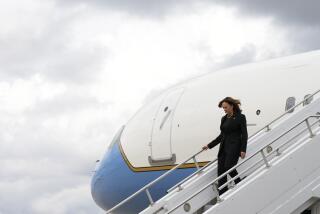Ex-Arkansas State Worker Says Clinton Harassed Her : Politics: White House denies that then-governor made sexual advances to her in 1991. Trooper says the two met but that she was willing to meet again.
- Share via
WASHINGTON — A former Arkansas state employee, saying she wanted to restore her “good reputation,” charged Friday that then-Gov. Bill Clinton made sexual advances toward her in his hotel room during a 1991 conference in Little Rock.
The charges by Paula Jones at a press conference here are the latest in a series of allegations of sexual misconduct that have plagued Clinton since he began his drive for the presidency in 1992. Her account offers support for allegations last fall by several Arkansas state troopers that Clinton used them to arrange extramarital encounters.
In a letter to the President, Jones’ lawyer, Daniel M. Traylor, asked for a public apology and warned of a possible lawsuit.
White House Press Secretary Dee Dee Myers said of Jones’ account: “It’s just not true.”
Jones, a slim, dark-haired woman in her late 20s, now lives in California but declined to say precisely where.
She said in an affidavit and in response to reporters’ questions that she went to Clinton’s hotel room because an Arkansas state trooper told her that the governor wanted to talk to her.
Although Jones had never met Clinton, she said she believed that she could trust him because he was the governor. At the time, Jones was employed by the Arkansas Industrial Development Commission.
But she asserted that after the trooper, whom she identified as Danny Ferguson, escorted her to the room and left her alone with Clinton, the governor became aggressive.
“He took my hand,” she said, and loosened his tie. “You have nice curves,” Jones said he told her. “I love the way your hair goes down your body.”
Jones said Clinton pulled her to him, slid his hand up her leg and asked her for “a type of sex.”
When she protested that she needed to return to her assignment at the conference registration desk in the lobby, she said Clinton told her: “Don’t worry about that.”
Jones said she rebuffed the governor’s advances and left in 15 minutes.
“It was wrong that a woman could work in the workplace and be harassed by a figure that high,” she said. “It was just humiliating what he did to me.” Jones was accompanied Friday by her husband, Steven, who said: “What happened in that room was a disgrace to Paula. I have bad feelings toward Mr. Clinton.”
Jones’s account of the episode was supported by affidavits from a co-worker, Pamela Blackard, and a friend, Debra Ballentine, both of whom said Jones told them about the incident on the day Jones said it occurred, May 8, 1991.
In an interview last fall with The Times, Ferguson also confirmed an account of the meeting, saying Clinton pointed out the woman at the conference. Clinton reportedly directed Ferguson to approach her on his behalf, saying, “She has that come-hither look.” Ferguson said Clinton directed him to temporarily obtain a room at the hotel, which Ferguson did by telling the hotel manager that Clinton was expecting an important call from the White House and needed privacy. Ferguson confirmed that he told the woman that the governor was in the room and wanted to see her.
Jones did not pursue her harassment allegation at the time, Traylor said, because she felt she had no recourse. “The police were the people who had escorted her up,” the lawyer said. Moreover, he said, Clinton had said he was friends with Jones’ boss.
She subsequently married and moved to California, where her husband was transferred. The couple has one child.
Jones came forward, Traylor said, because of a report of the episode in the January issue of the American Spectator.
The story, which identified her only as “Paula,” reported that she had spent an hour in Clinton’s room and had told Ferguson that she was willing to become the governor’s “regular girlfriend,” if Clinton “so desired.”
Trying to clear her name, she called Traylor, who asked a friend who purportedly had access to the President to “make an overture” to him, asking for an apology. Word came back, Traylor said, that “there is no common ground; you all go do what you got to do.”
In his interview with The Times, Ferguson said the woman had stayed with the governor for about 30 minutes and told Ferguson that she would be willing to meet with Clinton again.
Jones’ press conference was held jointly with one arranged by Cliff Jackson, the lawyer for two state troopers, Larry Patterson and Roger Perry, who alleged in articles in the Los Angeles Times and the Spectator that they helped Clinton arrange extramarital assignations with women while he was governor.
Patterson told reporters here Friday that he also had been asked by Clinton to approach young women who the governor thought had “a come-hither look.” Of these women, Patterson, said, “there were never any that refused to meet him (Clinton) or give her name or telephone number.”
Jackson’s part of the press conference was intended to raise money for a “whistle-blower” fund to help pay legal expenses and provide other kinds of financial assistance to people willing to corroborate Patterson’s and Perry’s accounts of Clinton’s behavior.
The press conference was held at the Omni Shoreham hotel, which is also housing the annual Conservative Political Action Conference. Jackson is scheduled to participate in a conference panel discussion of Clinton and the media today.
More to Read
Get the L.A. Times Politics newsletter
Deeply reported insights into legislation, politics and policy from Sacramento, Washington and beyond. In your inbox three times per week.
You may occasionally receive promotional content from the Los Angeles Times.










